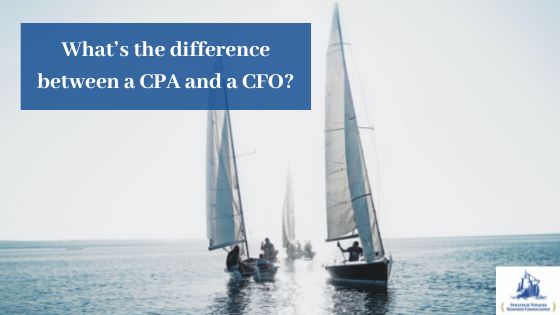“What’s the difference between a CPA and a CFO? And, doesn’t my CFO need to be a CPA?”
The more and more I network with other business leaders, other entrepreneurs, and other professionals, the more I get asked this question. For clarification, I’m not a CPA. I don’t want to be a CPA. However, I do think CPAs are a wonderful asset to any organization, if used correctly. The problem is that many business owners I talk to go to their CPA for the wrong advice.
What do I mean by that? Well. By the very definition of a CPAs designation, they are a certified public accountant. Accountant. Which means one who accounts for. As in, accounting for things that have already happened. You see, an accountant is someone who is great (or should be great) at articulating what has already been done. They make fancy accounting reports about your historical performance and help you categorize your transactions for things you’ve already spent money on. This is all “rear view.”
I don’t want to come off as being “anti-accountant.” An accountant is a very necessary function within a business as they help to give perspective. Meaning, if all you knew was that your business generated $10,000 in profit in a month, you wouldn’t be able to determine if that’s more or less than last year, more or less than what was projected, or if that’s going to be enough to accomplish your business goals without the insight a strong accountant brings.
A CPA, to reiterate, is a certified public accountant. Specifically, they are an accountant who specializes in taxes, and has passed lots of tests and has to take lots of continuing education towards their certification and licensure. They are the ones who look at what you spent and tell you how much you owe the government. In a nutshell, that’s the role of a CPA.
A CFO, by contrast, is a Chief Financial Officer. Or, as I’ve started to say, a Chief Forecasting Officer. Yes, some CFOs are CPAs, but that’s not always the case.
When you’re talking about the difference in their roles, the CPA tells you what has already happened and the CFO helps you map out what you want to have happen. They should be helping you forecast your finances, consider capital expenditures (fancy term for big purchases), when there’s enough money to hire people or invest in software, or help you manage your cash for upcoming expenditures.
As Strategic Voyages Business Consultants is the Outsourced CFO Team for companies that don’t have a full time CFO, we bring a holistic approach to business finances. We have CPA’s on our team to help with the highly technical questions related to tax treatment and to ensure our clients aren’t paying more than they ought to in taxes. We also have bookkeepers and accountants on our team to ensure the financing reports we’re reviewing with our clients are accurate and can be relied upon to accurately forecast where the business is headed and what the business will need in the future.
Companies that find the most value from engaging with us generate between $1M and $10M a year in revenue and haven’t quite reached the point where a full time CFO is necessary for one reason or another. Full time CFOs often make between $100K and $200K a year plus bonuses and benefits. Our packages for companies are significantly less than a full time person and we’re available to assist as much or as little as the business owner needs.
The conversations are different too. While we respect the need for (and often facilitate the) conversations around tax treatment of specific expenses, we tend to focus on the direction of the organization and the leaders within the organization.





